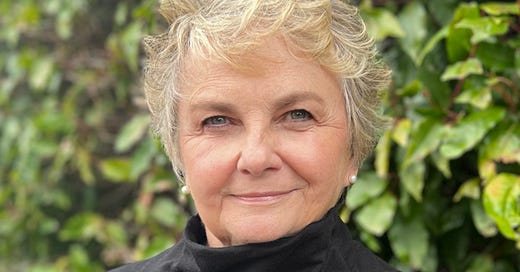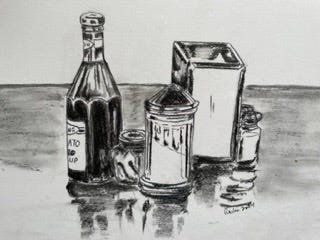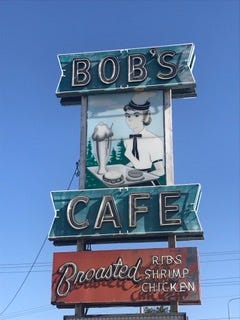Rhonda’s bedroom was small. She did not have much stuff but I knew we had to triage: dispose of, give to goodwill, or keep. Dad opened the three white garbage bags so it was easy to sort. Suddenly I heard this guttural noise behind my back and turned to see Dad staring into the large white garbage bag he held between his hands.
“Ok, Rocko, what do we do now?” He asked, looking helpless and dazed.
I was in my dead sister’s bedroom with Dad deciding what items to keep or throw away. Quickly I realized Dad, the director, had lost his script and I was the director, the parent to my parent at this unexpected time in both of our lives. In a matter of seconds, we flipped roles. The director, the authoritarian figure all of my life, turned to me for guidance.
My parents’ café was a Midwestern “Cheers,” like the Boston pub TV show, where everyone knows your name, and at Bob’s, they know what you eat. Either Rhonda or I would serve you your usual, Mom flipping pancakes, Dad ringing up your receipt at the cash register. Customers were often like family. When they cried at the counter telling their stories, Mom cried with them. When they celebrated birthdays, they often brought cakes and brownies to share with my parents and customers in the café.
Dad was notorious for chasing down bad checks from customers, a detective story he relished solving. One time a customer’s check bounced, unpaid for about a year. Dad made arrangements to have his car upholstered and when the bill was presented, Dad handed over the bad check to the owner who had written the bad check and said “We’re even.” Some would say that was midwestern justice.
And then my family’s world unraveled. It was pandemonium when Rhonda died.
On October 1, 1982, twelve people were shot, including my sister, in a little bar, the Mother Lode, in Sacramento, California, in one of the first mass shootings in the US. Three people died, nine were severely wounded.
The concept of justice was elusive and shifted as our family slowly began to realize the loss of Rhonda to our family circle.
We all grieved differently – father, mother, sister, and brother.
The phone rang.
“Your dad won’t buy a headstone for Rhonda’s grave,” Mom said.
The next day, the phone rang again.
“Your Mom wants to buy a headstone but I don’t think there is any hurry. Rhonda is not coming back,” Dad told me.
It took almost a year before a headstone appeared on Rhonda’s grave.
In 2020, our basement flooded. While unpacking a box of books, I found my mother’s book of poetry by Elizabeth Browning. When I picked up the book, the page fell open to a poem on Grief, Browning’s tribute to her dead brother. Across the page from the poem was an analog two-by-six-inch photo strip of Rhonda, around age 13 years old, in four poses: smiling, contemplative, looking at a bug on the tip of her nose, and a somber pose. I stopped breathing for a second.
I had stumbled onto my mother’s private moment in a time and place where I had never been. I imagined Mom sitting in the backroom at the café, between customers, rereading Browning’s poem over and over. I thought back to how many times Mom must have been mourning in private ways that the rest of the family was not privileged to see or hear.
Over the years, my grief has sometimes taken a backstage presence in my life but I find it easily jolted when I hear of mass shootings. I still cry when I hear of another one. At dinner parties when gun control is mentioned, grief ambushes my ability to contribute to the conversation. Images, words, sounds, smells or emotions trigger memories that seem out of sync or appear with no warning. It is challenging to tell the story in a coherent narrative that is easy to understand or explain.
Our country is still struggling with how to create community in the face of widespread, seemingly random violence. Forty years later, there is no magic pill that gives it any meaning. Not even time. Violence is just that, violence, and nothing more.
Over the years I’ve told the story of how Rhonda was shot, each time with more clarity. I would go over the details of her death because it helped me confirm the reality, let it sink in. Bereavement counselors suggest that when someone is telling you their story over and over again, they are trying to figure out something. I was trying to find meaning.
Telling the story of tragedy is important because, without stories, the memory becomes frozen. And without memory, you cannot imagine how things could be different. The challenge I faced in writing my story is that traumatic events are almost impossible to put into words. My family struggled in reconciling the imprint of trauma on our lives and like good Midwesterners, we did not talk about it. Yet I feel compelled to tell my family’s story with the hope it helps other people heal and survive.
Back in Rhonda’s room, I found boxes of Rhonda combs: a marketing strategy Dad created for her hairdressing business, a comb with Rhonda’s contact info called a “Rhonda Comb.” I put them in the third pile: keep.
Rockie Lyons has taught writing at Iowa State University, Oregon Institute of Technology, Portland State University. For many years she worked in high tech managing technical training teams. She has just finished a memoir called Over the Counter: Losing my Sister to a Mass Shooting, and is looking for a publisher.
Please consider a paid subscription. All funds go to pay the writers of this column.
And join us at the Iowa Writers Collaborative for a once a month Zoom discussion where you will meet the writers. Here’s the link to our meeting on Friday, Feb. 24 at noon CT. Join us:
Join Zoom Meeting
https://us06web.zoom.us/j/81660763778?pwd=OEYyK1NsZ25CTEsraWNvSXZTdFZQZz09






Thank you. So powerful...so tragic...
Thank you so much Rocky for telling the story of your sister and your family is such a precise, poignant, and powerful way.